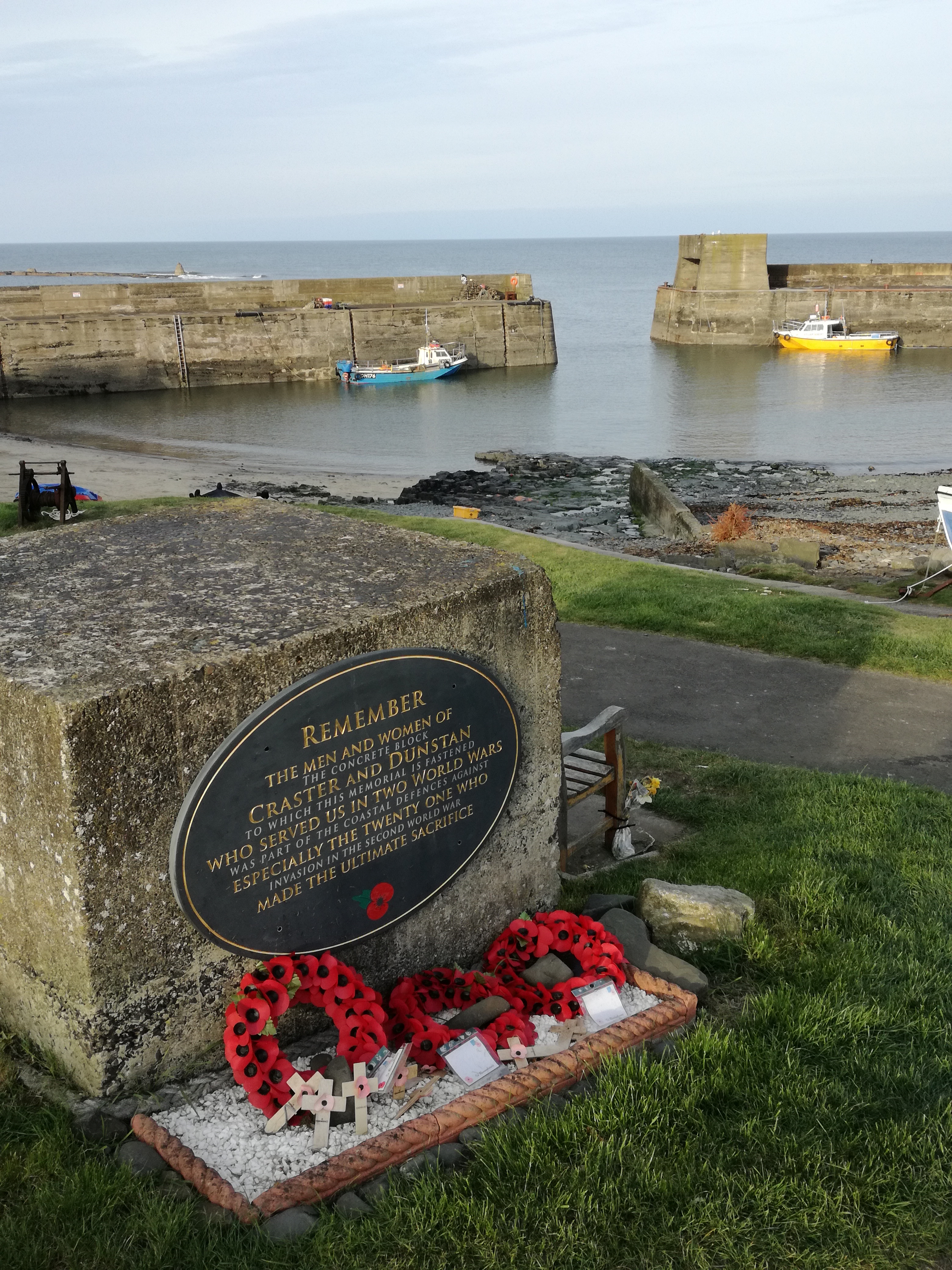As part of my Easter break, I travelled up to Northumberland this year (2017). Whilst there, I was told by the friends we stayed with that a little town called Craster sold the best kippers in probably the whole world. I wouldn’t know because by the time we got there the shop was shut, but the name of the town – Craster – made me think of Captain Craster, an officer who served with the Special Operations Executive in France and (of course) in Burma.
The Second World War is never far away, even in a little fishing village; this little memorial is attached to invasion defences beside Craster harbour:

If you want to visit Dunstanburgh Castle, you park at Craster and walk along the coast. You could do this National Trust trail.
The next day, we went to the Roman ruins/fort at Arbeia, which now almost, but certainly once-upon-a time, overlooks the Tyne Estuary at Tynemouth. At Arbeia, we were lucky enough to have a ‘Roman Doctor’ on duty. He was a fantastic young historian, who apparently studied Politics, but runs his own educational company with his mate, the ‘Roman Cook’. In conversation, he mentioned that there was once a King in Northumberland called Oswin.
Now I had a King called Oswin, and a town called Craster. Captain Craster’s first name was Oswin…
Saint Oswin was King of Deira from 644 until 651 when he was murdered by order of his sister’s husband, King Oswy. King Oswin’s remains were lost over the years, until a monk called Edmund apparently had a vision in which he found them. Captain Oswin Craster’s middle name was Edmund. After Edmund the monk ‘found’ Saint Oswin’s remains and relics, they were kept in Tynemouth Priory.
In his SOE file, there are two addresses for Captain Oswin Edmund Craster. One is given as Preston Tower, Chathill, Northumberland. Edmund Craster bought this house in 1802, but in 1861 it was sold to the Baker Cresswell family. Captain Oswin Edmund Craster’s mother’s maiden name, according to his SOE file, was Baker Cresswell, born in 1880.
His second address is given as Longwall Cottage, Oxford. Right next to Longwall Cottage is St. Edmund Hall, thought to be the ‘oldest surviving academic society to house and educate undergraduates in any university’ according to Oxford University. It would take a bit more digging to find out if St. Edmund of Abingdon was connected to Northumberland in any way; it looks like he wasn’t.
Captain Craster read History at New College, Oxford, before the war. To see his brief war biography, visit The Men of SOE Burma, on this website, but to finish up here…
…Captain Craster was parachuted into France as part of Jedburgh team Stanley in August 1944. The friends who we stayed with ‘up north’ have a dog. His name is Stanley.

Like what you see?
Consider a small donation to keep the website going?
£1.00

April 21, 2017 at 2:54 pm
This sounds like a unique place to visit- what country is this in? Check out my latest post at https://courtneylivin.wordpress.com/2017/04/21/weekend-in-hershey/ !
LikeLike
April 22, 2017 at 4:04 pm
Hi Courtney,
Northumberland is in NE England, just south of Scotland. There is plenty to see and do, including some lovely beaches.
Rich
LikeLiked by 1 person
April 22, 2017 at 2:48 pm
Round and round in circles we go! Very strange the connections in life.
LikeLike
May 31, 2017 at 10:25 pm
And round in another circle?…..My first-time reading of this site, but the name Baker Cresswell immediately caught my eye, as as Capt Joe Baker Cresswell was the commanding officer of HMS Bulldog, the destroyer that hunted down U110 and captured an Enigma machine. He was later High Sheriff of (of course) Northumberland. More WW2 heroics……
LikeLike
May 31, 2017 at 10:34 pm
Ha! That would be amazing. How many Baker Cresswells can there be…!?!
LikeLike
July 4, 2017 at 6:26 pm
Very good. Oswin was my Dad. He and I once lived at Craster Tower. Edmund is a family name.
Edmund
LikeLike